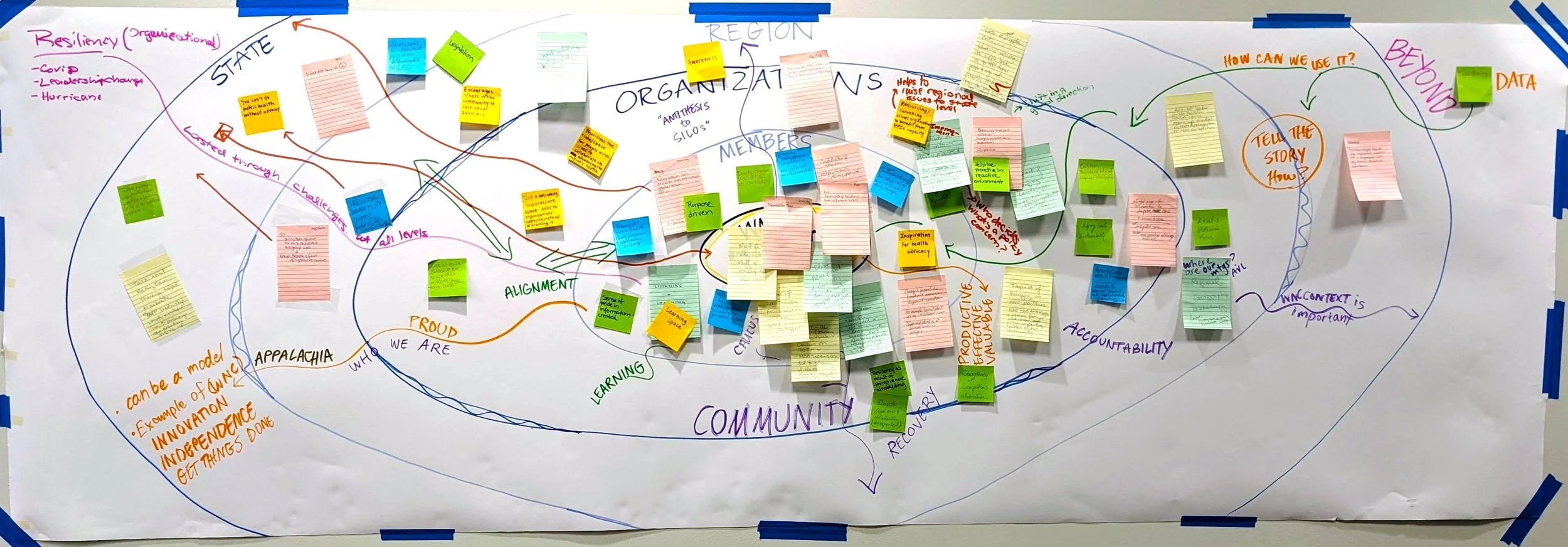Announcing the Release of the WNC HPI 2024-2025 Impact Report
The WNC Health Policy Initiative is pleased to announce the release of our 2024-2025 Impact Report. In this report, you’ll find a summary of the collaborations, connections, impacts, and successes achieved by our regional partners and participants over previous fiscal year.
Click on the image above or visit our How We Impact page to download a copy of our 2024-2025 WNC HPI Impact Report.
Key Impacts and Outcomes
Connecting WNC Health and Healthcare Leadership
Every month, the WNC HPI hosts discussions, work groups and events designed to promote and develop recommendations for improving the health and wellbeing of all Western North Carolinians in our three core focus areas: Access to Healthcare, Social Determinants of Health, and Healthcare Workforce Development.
Over the past year, the WNC HPI hosted 21 policy forum discussions featuring over 30 guest speakers and presenters and engaging with nearly 200 regional leaders and policymakers representing 80 regional, state and national organizations. During this time, we supported cross-sector and bipartisan discussion to support policy development and recommendations around issues such as creating a sustainable, statewide childcare infrastructure, understanding our region’s behavioral and physical health provider capacity and gaps, supporting programs such as the Healthy Opportunities Pilot that provide vital health-sustaining supports such as food boxes, housing assistance, and other needs to our most vulnerable residents, and exploring ways to increase opportunities for and the development of our healthcare workforce.
Regionally-Impactful Research
In May of 2025, the WNC HPI began conducting research funded by the NC Collaboratory to explore what we can learn about our region’s healthcare response in the days and weeks following Hurricane Helene’s devastating landfall across Western North Carolina on the evening of Sept 27, 2024. This research was identified as a priority by the WNC HPI leadership and partners during our post-Helene reconnecting and refocusing convenings. The research team will be conducting interviews with regional healthcare leadership and conducting a literature review to learn what we can do to support a more resilient healthcare system and a more effective preparedness efforts for future disasters. The research will be ongoing through fall and we hope to be able to publish/present our findings by the end of the year.
You can learn more about this research via our new podcast series, where the research team will be talking about the background, process and findings of the research as it unfolds.
Ripple Effect Mapping
The WNC Health Policy Initiative regularly engages in internal and external evaluation and reflection processes to gauge not only the impact of our work, but also our effectiveness in meeting our shared goals end vision.
In May 2025, the WNC HPI participated in a series of Ripple Effect Mapping activities to discover, map and share the community impact generated by our partners’ participation in the WNC HPI. This process involves one-to-one interviews, group interviewing, mind mapping, and qualitative data analysis to “identify outcomes in interventions that have a goal beyond specific individual outcomes.“ (via the University of Minnesota Extension)
Assisted by activity facilitators, participants use appreciative inquiry to elicit and share stories of impact with one another, then engage in a brainstorming activity to capture the effects (the "ripples") of the project and highlight connections they see existing or that emerge between those impacts.
After this activity, the captured data is clarified, coded and analyzed to identify key themes and shared back with the group to capture any additional comments, context and conversation those results might inspire, including identifying opportunities for growth or unexpected outcomes to support future planning.
WNC HPI Ripple Effect Mapping
Dr. Ameena Batada captures comments and connections share by WNC HPI participants to learn about and visualize the collective impact our work is having in our region.
WNC HPI Ripple Effect Map
Ripple Effect map created by WNC HPI participants highlighting observed impacts organized by “region” or scope. View larger image
Participant Impacts and Outcomes Survey
Participants were additionally surveyed on five key impacts and outcomes that they either personally experienced as a result of their participation in WNC HPI discussions and activities, or that they were aware of that came about as a result of the work of the WNC HPI whether or not they were personally involved. The results from that survey can be seen below.
Click here to download a text-only pdf of REM and Survey Results
Acknowledgements and Thanks
As we enter the final year of our current grant cycle, the WNC HPI would like to extend our deepest appreciation and gratitude for the dedicated work of our regional partners and participants. With both the policy and physical landscapes of Western North Carolina becoming increasingly more changeable and challenging, it is more important than ever that we as a region continue working together to build a healthy, strong, resilient and thriving Western North Carolina. We look forward to continuing this challenging and rewarding work with all of you in the coming year.
Disclaimer
This content was developed by the WNC Health Policy Initiative in consultation with people and organizations with connections to the health of people of Western North Carolina. Individual or organizational opinions, findings, conclusions, or recommendations are those of the relevant author(s)/interviewee(s) and do not necessarily reflect the view of the WNC Health Policy Initiative or its host institutions of the University of North Carolina Asheville (UNCA), Mountain Area Health Education Center (MAHEC) or our funders.





